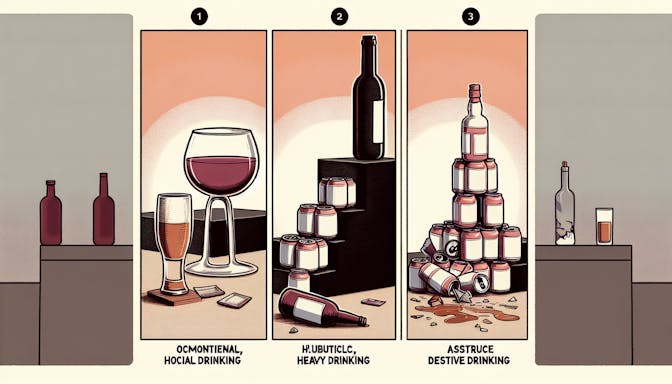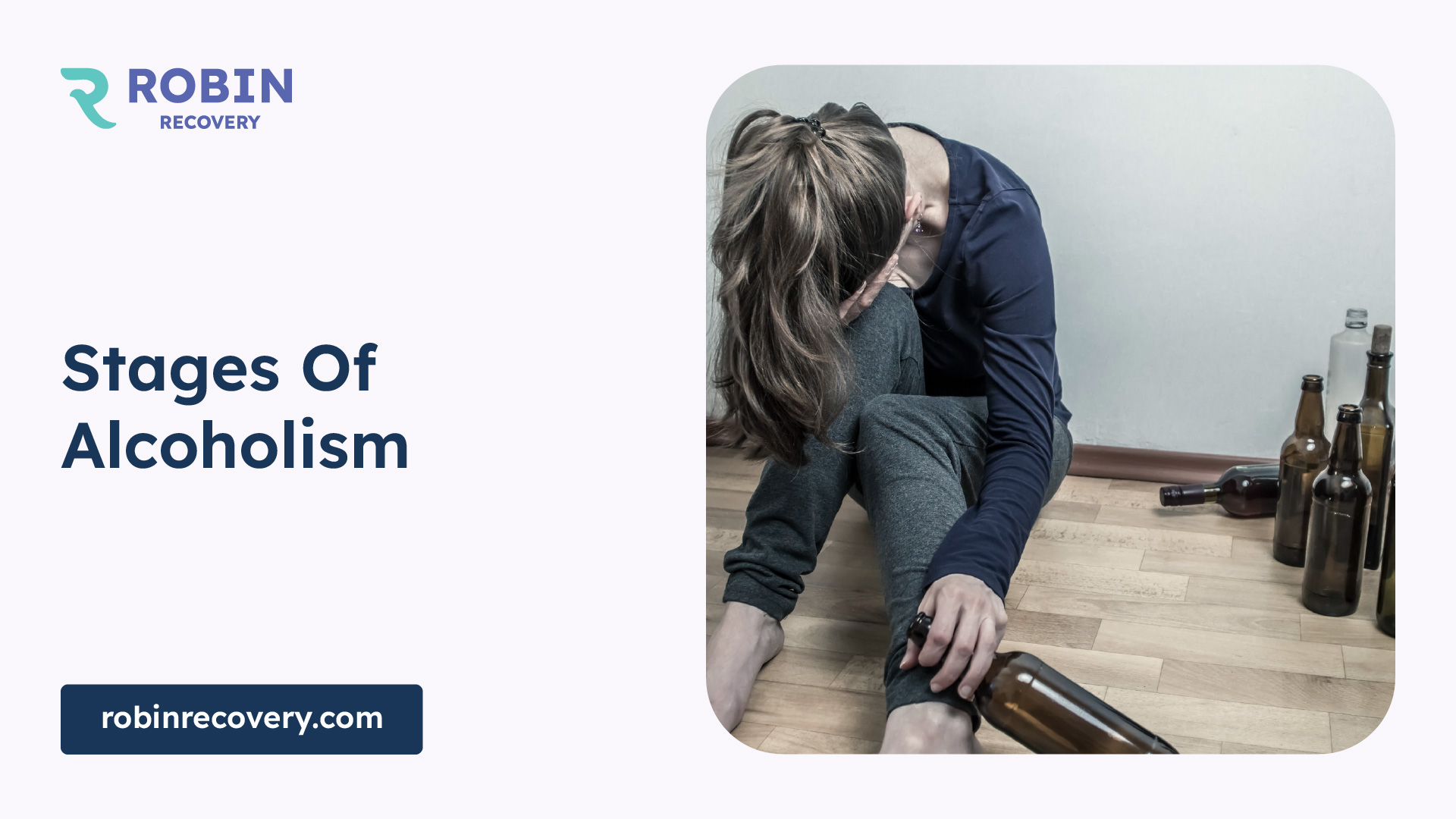Stages Of Alcoholism

Understanding Alcohol Use Disorder
In order to comprehend the stages of alcoholism, it's vital to first understand Alcohol Use Disorder (AUD). AUD is a medical condition diagnosed when a patient's drinking causes distress or harm, ranging from mild to severe.
Definition and Severity Levels
AUD is not a one-size-fits-all condition. It varies in severity and is categorized into three levels: mild, moderate, and severe. The level of severity is determined by the number of symptoms present. A mild AUD is identified when there are 2 to 3 symptoms, moderate with 4 to 5 symptoms, and severe when there are 6 or more symptoms [2].

Here's a breakdown of the severity levels:
It's noteworthy that AUD is characterized by an impaired ability to stop or control alcohol use despite adverse consequences. The 2022 National Survey on Drug Use and Health reported that 28.8 million adults ages 18 and older (11.2% in this age group) had AUD in 2021, and an estimated 753,000 adolescents ages 12 to 17 (2.9% of this age group) had AUD during the same time frame.
DSM-5 Criteria for Diagnosis
Health care professionals use criteria from the Diagnostic and Statistical Manual of Mental Disorders, Fifth Edition (DSM-5), to diagnose AUD and to determine its severity based on the number of criteria met by the individual's symptoms.
One of the criteria that stands out in the DSM-5, which was not present in the previous version (DSM-IV), is the intense craving for alcohol. This is typified by wanting a drink so badly that one couldn't think of anything else.
The DSM-5 offers a comprehensive list of criteria that serve as a guide for health care professionals to accurately diagnose AUD and determine the appropriate treatment. By understanding the definition, severity levels, and diagnostic criteria of AUD, one can better comprehend the stages of alcoholism and the journey towards recovery.
Effects of Alcoholism on Health
Alcoholism, especially in its later stages, can have severe negative impacts on an individual's health. These effects can be broadly categorized into physical and mental consequences.
Physical Consequences
Excessive drinking can take a significant toll on the body, leading to a range of physical health issues. These impacts can affect various parts of the body, including the brain, heart, liver, pancreas, and immune system.
Some of the physical health consequences of alcoholism include:
- Brain and Nervous System Problems: Heavy drinking can lead to issues with thinking, decision-making, memory, and motor skills. It can also result in long-lasting nerve damage.
- Heart Disease: Chronic heavy drinking can increase the risk of heart disease by making blood clots and high levels of fats and cholesterol more likely. It can also make it harder for the heart to pump blood effectively [5].
- Liver Disease: Alcoholism can lead to various liver problems, including alcoholic hepatitis, cirrhosis, and fibrosis.
- Digestive Issues: Alcohol abuse can lead to inflammation of the pancreas (pancreatitis), gastritis, and even certain types of cancer.
- Cancer: There is a strong association between heavy alcohol use and various cancers, including those affecting the mouth, throat, esophagus, liver, breast, and intestines.
Mental and Emotional Impact
Alongside the physical consequences, alcoholism can also have profound mental and emotional impacts. Alcohol depresses the central nervous system, leading to reduced judgment skills, lower inhibitions, and poor choices, potentially resulting in dangerous situations or behaviors.
Excessive alcohol consumption can also contribute to mental health conditions like depression and dementia. It can adversely affect mood and behavior and can significantly influence an individual's ability to function in their daily life.
Understanding these health effects is crucial in recognizing the seriousness of alcoholism and the need for timely intervention and treatment. The impact of alcoholism on health underscores the importance of seeking help and support at the earliest stages of alcoholism.
Stages of Alcoholism
Alcoholism, also referred to as Alcohol Use Disorder (AUD), is a condition that emerges from a pattern of alcohol abuse where there's continued drinking despite negative consequences. It affects people of all ages and stages of life, and the severity of the disorder lies on a spectrum, ranging from mild to severe dependence, also known as chronic alcoholism. Understanding the stages of alcoholism can be crucial in identifying and addressing the issue.
Early Signs and Symptoms
The early stage of alcoholism is often characterized by increased tolerance to alcohol and physical cravings. According to the Diagnostic and Statistical Manual of Mental Disorders, Fifth Edition (DSM-5), one of the criteria for AUD at this stage might include wanting a drink so badly that one couldn't think of anything else. At this stage, the individual might not recognize that they have a problem, though they may start to drink more frequently or in larger quantities.
Middle Alcoholic Stage
The middle stage of alcoholism, as per the Jellinek Curve created by E. Morton Jellinek and later revised by British psychiatrist Max Glatt, marks a period where it becomes obvious to those close to the individual that they're struggling [7]. They might miss work, forget responsibilities, become irritable, and show physical signs of alcohol abuse such as facial redness, weight gain or loss, sluggishness, or stomach bloating. At this point, support groups can be a highly effective form of help.
Chronic Alcoholism
Chronic alcoholism, the most severe form of AUD, is characterized by a total loss of control over alcohol consumption. This late stage of alcoholism can lead to severe health issues, including liver disease, heart problems, certain types of cancer, and neurological complications. Chronic alcoholism can also result in significant mental health issues, including depression and anxiety disorders. The 2022 National Survey on Drug Use and Health reported that 28.8 million adults ages 18 and older (11.2% in this age group) had AUD in 2021.
Recognizing the stages of alcoholism is essential in order to seek appropriate treatments and supports. It's important to remember that help is available, including behavioral therapies, medications, support groups, and resources. If you or a loved one is struggling with alcoholism, reach out to a healthcare professional to discuss the best treatment options.
Factors Influencing Alcohol Use Disorder
When analyzing the stages of alcoholism, it's equally crucial to understand the different factors that contribute to Alcohol Use Disorder (AUD). These factors encompass genetic and environmental components, as well as a variety of risk factors and vulnerabilities.
Genetic and Environmental Factors
Genetic, psychological, social, and environmental factors can all impact how drinking alcohol affects an individual's body and behavior. Theories propose that for certain individuals, drinking has a different and stronger impact that can lead to Alcohol Use Disorder Mayo Clinic.
Genetic factors, for instance, can play a role in AUD, with certain genes influencing how alcohol is metabolized and how the brain responds to alcohol. Individuals with a family history of alcoholism are at a higher risk of developing the disorder Mayo Clinic.
Environmental factors such as easy access to alcohol, societal norms and attitudes towards drinking, and peer pressure can also contribute to the development of AUD Mayo Clinic.
Risk Factors and Vulnerabilities
Certain risk factors and vulnerabilities can increase the likelihood of an individual developing AUD. Initiating alcohol consumption during the teenage years, for instance, is a significant risk factor for AUD. The disorder more frequently occurs in the 20s and 30s, although it can begin at any age Mayo Clinic. Early initiation of alcohol use can have a more significant impact on brain function and increase the likelihood of developing addiction later in life Mayo Clinic.
Moreover, individuals with a history of trauma, such as physical or sexual abuse, are more vulnerable to AUD as they may resort to alcohol to cope with the emotional pain and distress associated with the traumatic experiences Mayo Clinic.
Co-occurring mental health disorders, such as depression, anxiety, bipolar disorder, or schizophrenia, can increase the risk of developing AUD. Alcohol may be used as a form of self-medication to alleviate symptoms or cope with emotional distress Mayo Clinic.
Understanding these factors can be instrumental in recognizing the risks and taking preventive measures to reduce the likelihood of developing AUD. Awareness can also help in identifying the early stages of alcoholism, allowing for more effective interventions and treatment.
Treatment Options for Alcohol Use Disorder
When dealing with the various stages of alcoholism, a comprehensive treatment plan is crucial. This typically involves a combination of behavioral therapies, medications, and support groups or resources.
Behavioral Therapies
Behavioral treatments for alcohol problems are aimed at changing drinking behavior through counseling. Therapies are designed to help individuals develop the skills necessary to stop or reduce drinking, build a strong social support system, and deal with potential triggers and stressors without turning to alcohol. Such treatments have been shown to be beneficial and can be provided in an outpatient or residential setting [1].
Treatment modalities may include cognitive-behavioral therapy, motivational enhancement therapy, and family therapy. The specific type of therapy implemented will depend on the individual's needs, preferences, and severity of alcoholism.
Medications for AUD
Alongside behavioral therapies, medications can also play a key role in the treatment of alcohol use disorder (AUD). Currently, three medications are approved in the United States to help people stop or reduce their drinking and prevent relapse: Naltrexone, Acamprosate, and Disulfiram. These medications are usually prescribed by a primary care physician or other health professional and may be used alone or in combination with counseling [1].
Here's a brief overview of these medications:
- Disulfiram: This medication can help prevent drinking by producing unpleasant physical reactions like flushing, nausea, vomiting, and headaches when alcohol is consumed.
- Naltrexone: Naltrexone works by blocking the pleasurable feelings associated with alcohol consumption.
- Acamprosate: Acamprosate helps to combat alcohol cravings, making it easier for individuals to maintain sobriety.
All of these medications should be taken under the supervision of a healthcare provider due to potential side effects and interactions with other medications.
Support Groups and Resources
Support groups are an integral part of coping with AUD. They provide a safe and supportive environment where individuals can share their experiences, learn from others who are dealing with similar issues, and receive encouragement and motivation to maintain sobriety.
Many individuals with alcohol problems and their families have found these groups beneficial. They often serve as a valuable resource for preventing relapses and dealing with the challenges that come with recovery.
Support groups can be found in most communities and online, offering a range of options to suit different needs and preferences. Some well-known support groups include Alcoholics Anonymous (AA), SMART Recovery, and Al-Anon (for family members).
In conclusion, treating AUD involves a multifaceted approach combining behavioral therapies, medications, and support groups. It's important for individuals struggling with alcoholism to seek help from healthcare professionals and support networks to successfully navigate through the recovery process and improve their quality of life.
References
[2]: https://www.niaaa.nih.gov/publications/brochures-and-fact-sheets/understanding-alcohol-use-disorder
[3]: https://www.niaaa.nih.gov/publications/brochures-and-fact-sheets/alcohol-use-disorder-comparison-between-dsm
[4]: https://www.niaaa.nih.gov/alcohols-effects-health/alcohols-effects-body
[5]: https://www.webmd.com/mental-health/addiction/addiction-heavy-drinking
[6]: https://www.mayoclinic.org/diseases-conditions/alcohol-use-disorder/symptoms-causes/syc-20369243
[7]: https://www.hazeldenbettyford.org/articles/stages-of-alcoholism
[8]: https://www.mayoclinic.org/diseases-conditions/alcohol-use-disorder/diagnosis-treatment/drc-20369250
